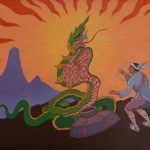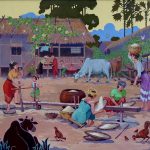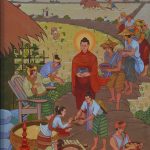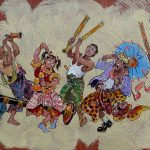The Irrawaddy Magazine |
- NLD Central Women’s Committee to Support Kachin IDPs
- Ten Years On, Family Still Demands Answers in Slain Japanese Journalist’s Death
- Mandalay Blast Injures 1
- Enlightenment: Previous Lives of Buddha
- Hindus Cremated in Rakhine State’s Maungdaw
- US Envoy to UN Demands Myanmar Prosecutions, Weapon Curbs
| NLD Central Women’s Committee to Support Kachin IDPs Posted: 29 Sep 2017 06:56 AM PDT YANGON — The National League for Democracy's (NLD) new-formed Central Women's Committee plans to visit Kachin internally displaced people's (IDP) camps as the committee's first mission on October 4, said chairperson Dr. May Win Myint. The NLD's new-formed Central Women's Committee Team will donate rice and oil, sanitary products, and provide medical services to 1,350 IDPs in Kachin State during their one-week trip, said Daw Zin Mar Aung, a secretary on the committee. In Kachin State, more than 120,000 people have been displaced from their original lands and forced to seek refuge in IDP camps since June 2011, due to renewed fighting between Myanmar's military and the Kachin Independence Army following the breakdown of a 17-year ceasefire. Dr. May Win Myint will led the team which of 10 – 15 participants. "The NLD Health Network's members will also join the trip. The doctors from the health network and the chair, Dr. May Win Myint, will give medical check-ups to the IDPs," Daw Zin Mar Aung said. The team will visit eight camps in Myitkyina, Waingmaw, Mohnyin, and Mogaung townships.  "We decided to go and support Kachin IDPs because they are in a forgotten situation," Daw Zin Mar Aung told The Irrawaddy on Friday, when asked why the committee choice Kachin State over Rakhine State, where there is also a refugee crisis. She explained that the UN, and NGOs and INGOs are focusing on meeting the needs of IDPs in Rakhine State, and that the government is also working to support the victims of the conflict there. Kachin civil society organizations and humanitarian groups have continuously called on the government to provide proper support to the IDPs who are struggling for their livelihoods and unable to meet basic needs due to long-term displacement. The NLD's Central Women's Committee was formed in early August, and discussed work at the state, regional, township, and ward and village tract levels, with the aim to promote women's empowerment and capacity building, Daw Zin Mar Aung said. The post NLD Central Women's Committee to Support Kachin IDPs appeared first on The Irrawaddy. |
| Ten Years On, Family Still Demands Answers in Slain Japanese Journalist’s Death Posted: 29 Sep 2017 06:50 AM PDT YANGON — For nearly a decade, Noriko Ogawa relentlessly lobbied for the truth about the death of her brother who was killed by security forces in Yangon. Kenji Nagai, 50, a reporter for Tokyo's APF News, was in downtown Yangon on Sept. 27, 2007, covering the monk-led Saffron Revolution. He was hit when soldiers opened fire on the crowd. The then military government announced that he was among 11 protesters killed due to "warning shots." But forensic evidence showed that he was shot at point-blank range. Since then, Mr. Nagai's family members have demanded the Myanmar government open an official investigation into his killing and return his camera via the Japanese government. His sister Noriko Ogawa has advocated through the media for answers regarding the death of her brother every year. She sent plenty of emails to the Ministry of Foreign Affairs (MOFA) and also took several hours-long trips to the MOFA office in Tokyo from her home in Imabari city in Ehime prefecture. But nothing happened. So, on the 10th anniversary of her brother's death this month, the sister of the slain Japanese video journalist sent a letter directly to Myanmar State Counselor Daw Aung San Suu Kyi to demand acknowledgement from the Myanmar government that her brother's death was the result of an intended shot and that there would be concrete action taken on the issue. "I expect a sincere reaction [from Daw Aung San Suu Kyi] to my letter," she told The Irrawaddy. Noriko Ogawa said she sent the letter with "all of her emotion and thoughts she has pondered for 10 years" to the State Counselor because nothing happened when she contacted the Ministry of Foreign Affairs in Japan to transfer her message to the Nobel laureate. "The only thing I want is acknowledgement that my brother's death was the result of an intended shot. I am eager for your humanitarian decision and concrete action on this issue," writes the video journalist's sister in her letter to Myanmar's State Counselor. "Honestly speaking, I want to take down the militants who brutally shot my brother," Noriko Ogawa writes in the letter that was viewed by The Irrawaddy. "However, this is not realistic under the current circumstances. What is realistic is to please, please reveal what happened, and acknowledge that my brother was killed. In addition, I want to get back his camera, which he had held tightly in his hands [when he was shot]," the sister wrote. She told The Irrawaddy that the prime minister, deputy minister, minister of foreign affairs, and police chief had tried to convince the Myanmar government to admit the truth in the past. According to an announcement on Japan's Ministry of Foreign Affairs website, the then Japanese Prime Minister Yoshihiko Noda discussed the investigation and return of Mr. Nagai's camera with then President U Thein Sein at 2011 Asean-related summit meetings. The statement read that President Thein Sein said the government had been striving for investigation and cooperation with Japan but had not found Nagai’s belongings, adding that he was pained by Mr. Nagai’s death. "About the comment from the former President, Thein Sein, the fundamental recognition about Kenji's case is completely different from ours. We cannot accept it," Noriko Ogawa told The Irrawaddy.  Death in Yangon Kenji Nagai arrived in Yangon on Sept. 25, 2007, when Buddhist monk-led protests against the then military regime were underway. Toru Yamaji, president of the Tokyo APF, remembered that Nagai had been covering a story in Bangkok when the situation in Myanmar escalated. He told RFA in 2007 that he and Nagai had talked about the trip on the telephone, and Nagai had felt the protests in Myanmar would gradually grow to huge proportions and it would be a good opportunity to tell the world about the situation there. "So I gave him permission to go," he said. Adrees Latif, a Reuters photographer who captured the moment of Nagai's death on his camera, recalled that soon after the shooting started his eye caught the Japanese photographer flying backwards through the air. Instinctively, he started photographing, capturing four frames of the man on his back. "The entry point of the bullet is clear in the first frame, with a soldier wearing flip-flops standing over the man and pointing a rifle. "More shots rang out. I flinched before getting off two more frames—one of the man pointing the camera at the soldier, and one of his face contorted in pain. Beyond him, the crowd scattered before the advancing soldier," wrote Adrees Latif, who won a Pulitzer Prize for the picture. Noriko Ogawa recalled that she couldn't help shuddering and her heart froze when she saw her brother on the TV news upon the notification from the Ministry of Foreign Affairs. In her letter she told Daw Aung San Suu Kyi that despite more and more Japanese corporations making inroads in Myanmar, there has been no progress for the bereaved family, and time has been passing in vain for 10 years now. "My parents died four years ago, without any word from the army," she said in the letter. "I continue to go every month to the temple where he sleeps. I hope you will not overlook my sincere emotions," she added. The post Ten Years On, Family Still Demands Answers in Slain Japanese Journalist's Death appeared first on The Irrawaddy. |
| Posted: 29 Sep 2017 05:01 AM PDT MANDALAY – One man was injured in a blast outside a festival in Mandalay Region’s Chanayethazan Township on Thursday in an incident that was labelled a threat to the stability of the region by the local government. Ko Zaw Hein, 28, was taken to Mandalay General Hospital with injuries to his left arm and a motorcycle was destroyed after a suspected improvised exploding device was set off at 9:50 p.m. outside a Nyeint Pwe festival, according to local police. Police later seized the two mobile phones found near the motorcycle which were believed to be used as detonators for the blast, secretary for the Mandalay regional government U Myint Tin told reporters on Friday, adding that it was too early to identify the culprit and police had opened an investigation into the incident. "The blast was not large so there was no huge impact but it is clear someone is trying to threaten regional stability," he said. Security in Mandalay Region had been bolstered following government warnings earlier this month with joint patrols by police and local organizations and residents, but security forces will be put on alert to ensure the safety of locals, he said. The post Mandalay Blast Injures 1 appeared first on The Irrawaddy. |
| Enlightenment: Previous Lives of Buddha Posted: 29 Sep 2017 03:27 AM PDT Kyaw Phyu San is a devout Buddhist who rejoices in the teachings of Gautama Buddha more than 2,500 years after his death. "He enlightened people as well as stabilized and pacified their minds," said Kyaw Phyu San, who has made his name as an artist with his hit series about the Buddha and Dhamma—the teachings of Buddha. His sixth solo art exhibition 'Enlightenment' will be held from September 30 to October 9 at Lokanat Art Galleries in Yangon, and features works depicting Myanmar's rural scenes as well as Jataka tales— narratives about the previous lives of the Buddha. Born in Seikphyu in central Myanmar in 1953, Kyaw San Phyu has drawn the lives of Buddha and his teachings over the past 30 years. From 1990 to 1995, he illustrated for the best-selling comic series entitled 'Ten Great Birth Stories of Buddha,' which is about the 10 previous lives of Buddha. His illustrations have also appeared in books on Buddha's lives published in a number of foreign countries. He organized his first solo in 1998. "The main subject of this exhibition is the 10 Jataka tales," he said. The Jataka tales include Temiya, the mute prince; Mahajanaka, the lost prince; Suvanna Sama, the devoted son; Nimi, the noble king; Mahosadha, the clever sage; Bhuridatta, the dragon prince; Canda-Kumara, the honorable prince; Narada, the great Brahma; Vidhura, the eloquent sage; and Vessantara, the charitable prince. "Most people are only acquainted with Mahosadha, Suvanna Sama and Mahajanaka among the Jataka tales. I painted the other lives to acquaint people with them. These tales provide a lot of lessons," said the artist. His works on rural life include bells at Buddhist monasteries, an ox-driven oil-press, toddy palm workers and more. The exhibition will showcase a total of 36 paintings, priced between US$500 and $1,300. To depict the lives of Buddha, Kyaw Phyu San sometimes seeks advice from Buddhist monks and disciples who are well versed in Buddhism. "Buddha was born and attained enlightenment in India. But in my paintings, I set him in the Konbaung Dynasty [of Myanmar]," he said. The post Enlightenment: Previous Lives of Buddha appeared first on The Irrawaddy. |
| Hindus Cremated in Rakhine State’s Maungdaw Posted: 29 Sep 2017 12:24 AM PDT MAUNGDAW, Rakhine State — A funeral service was held on Thursday to cremate the remains of 45 Hindu villagers—including six children—of Ye Baw Kya village in northern Maungdaw Township unearthed on Sunday and Monday. A mass grave of 28 missing Hindu villagers was found on Sunday, and 17 others were discovered on Monday afternoon. More than 70 people, including Hindu spiritual leaders and relatives of the victims, attended the funeral, which was held according to Hindu rituals, Police Colonel Okkar Ko of the border guard police force told The Irrawaddy. "All of the bodies were cremated and the funeral service was conducted by Hindu religious leaders. The funeral was held near the place where the bodies were discovered," said the police colonel. The retrieval of the remains of Hindu villagers came after a Hindu woman of Ye Baw Kya village who fled to Bangladesh following the attacks of the Arakan Rohingya Salvation Army (ARSA) in August phoned and informed a Hindu community leader, who had fled to state capital Sittwe, about the killings. The government's statement—based on Hindu community leader U Ni Mal's testimony—on Sunday said ARSA arrested some 100 men and women from several Hindu villages in Kha Maung Seik village tract on Aug. 25 and killed the majority of abductees. On Wednesday, authorities showed local and international journalists the unearthed bodies. The government's Information Committee released a statement on Wednesday saying 163 people from Maungdaw District were killed and 91 people went missing from October 2016 to September 2017, following attacks by Muslim militants on border police posts. The post Hindus Cremated in Rakhine State's Maungdaw appeared first on The Irrawaddy. |
| US Envoy to UN Demands Myanmar Prosecutions, Weapon Curbs Posted: 28 Sep 2017 09:40 PM PDT UNITED NATIONS and YANGON — US Ambassador to the United Nations Nikki Haley on Thursday called on countries to suspend providing weapons to Myanmar over violence against self-identifying Rohingya Muslims until the military puts sufficient accountability measures in place. It was the first time the United States called for punishment of military leaders behind the repression, but stopped short of threatening to re-impose US sanctions which were suspended under the Obama administration. "We cannot be afraid to call the actions of the Burmese authorities what they appear to be—a brutal, sustained campaign to cleanse the country of an ethnic minority," Haley told the UN Security Council, the first time Washington has echoed the UN's accusation that the displacement of hundreds of thousands of people in Rakhine State was ethnic cleansing. Myanmar rejects the accusations and has denounced rights abuses. "The Burmese military must respect human rights and fundamental freedoms. Those who have been accused of committing abuses should be removed from command responsibilities immediately and prosecuted for wrongdoing," Haley said. "And any country that is currently providing weapons to the Burmese military should suspend these activities until sufficient accountability measures are in place," Haley said. Myanmar national security adviser Thaung Tun said at the United Nations on Thursday there was no ethnic cleansing or genocide happening in Myanmar. He told the Security Council that Myanmar had invited U.N. Secretary General Antonio Guterres to visit. A UNofficial said Guterres would consider visiting Myanmar under the right conditions. China and Russia both expressed support for the Myanmar government. Myanmar said earlier this month it was negotiating with China and Russia, which have veto powers in the Security Council, to protect it from any possible action by the council. The Trump administration has mostly hewed to former President Barack Obama's approach of forging warmer relations with Myanmar, partly aimed at countering China's influence in the resource-rich Southeast Asian country. Meanwhile, international aid groups in Myanmar have urged the government to allow free access to Rakhine, where an army offensive has sent more than 500,000 people fleeing to Bangladesh, but hundreds of thousands remain cut off from food, shelter and medical care. Refugees are still leaving Myanmar, more than a month after Muslim insurgents attacked security posts near the border, triggering fierce Myanmar military retaliation. Aid groups said on Thursday the total number of refugees in Bangladesh was now 502,000. The Myanmar government has stopped international aid groups and U.N. agencies from carrying out most of their work in the north of Rakhine state, citing insecurity since the Aug. 25 insurgent attacks. Aid groups said in a joint statement they were: "increasingly concerned about severe restrictions on humanitarian access and impediments to the delivery of critically needed humanitarian assistance throughout Rakhine State." "We urge the government and authorities of Myanmar to ensure that all people in need in Rakhine State have full, free and unimpeded access to life-saving humanitarian assistance." The government has put the Myanmar Red Cross in charge of aid to the state, with the help of the International Committee of the Red Cross. But the groups said they feared insufficient aid was getting through. Relations between the government and aid agencies had been difficult for months, with some officials accusing the groups of helping the insurgents. Aid groups dismissed the accusations, which they said had inflamed anger towards them among Buddhists in the communally divided state, and called for an end to "misinformation and unfounded accusations". Rights groups have accused the army of trying to push self-identifying Rohingya Muslims out of Myanmar, and of committing crimes against humanity. They have called for sanctions, in particular an arms embargo. United Nations Secretary-General Antonio Guterres warned on Thursday that the violence against self-identifying Rohingya Muslims in the northern part of Rakhine could spread to central Rakhine, where 250,000 more people were at risk of displacement. Guterres told the UN Security Council during its first public meeting on Myanmar in eight years, that the violence had spiraled into the "world's fastest developing refugee emergency, a humanitarian and human rights nightmare." A group of Republican and Democratic senators urged the Trump administration on Thursday to use the "full weight" of its influence to help resolve the crisis in Myanmar and Bangladesh. A letter seen by Reuters and signed by four Republican and 17 Democratic members of the 100-seat Senate also calls on Secretary of State Rex Tillerson and US Agency for International Development Administrator Mark Green to provide more humanitarian aid. The British Minister of State for Asia and the Pacific, Mark Field, described the situation as "an unacceptable tragedy" after visiting Myanmar and meeting leaders including Nobel laureate Aung San Suu Kyi, who has faced scathing criticism and calls for her Nobel prize to be withdrawn. Drownings Police in Bangladesh said they recovered the bodies of 14 refugees, including nine children, who drowned when their boat capsized off the coast in bad weather. A Reuters photographer said he saw several babies among the victims. The UN International Organization for Migration later put the toll at 15. Police officer Afrajul Hoque Tutu said three boats had capsized in heavy seas. Myanmar was getting ready to "verify" refugees who want to return, the government minister charged with putting into effect recommendations to solve problems in Rakhine said. Myanmar would conduct a "national verification process" at two points on its border with Bangladesh under terms agreed during a repatriation effort in 1993, state media quoted Win Myat Aye, the minister for social welfare, relief and resettlement, as saying. Myanmar authorities do not recognize Rohingya as an indigenous ethnic group, instead regarding them as illegal immigrants from Bangladesh. "The government hates us," said refugee Zafar Alam, 55, sheltering from rain near a refugee settlement in Bangladesh, referring to the Myanmar government. "I don't think I'd be safe there. There's no justice." The post US Envoy to UN Demands Myanmar Prosecutions, Weapon Curbs appeared first on The Irrawaddy. |
| You are subscribed to email updates from The Irrawaddy. To stop receiving these emails, you may unsubscribe now. | Email delivery powered by Google |
| Google Inc., 1600 Amphitheatre Parkway, Mountain View, CA 94043, United States | |









